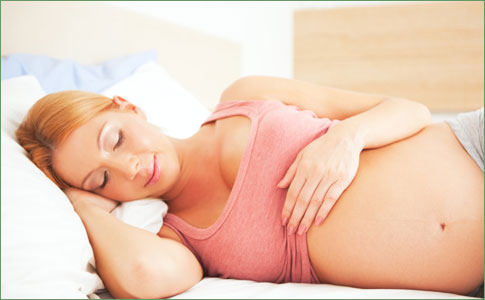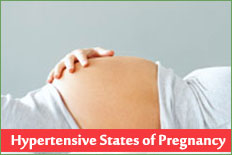Health Centers > Pregnancy Health Center > Early Pregnancy Risk
Early Pregnancy Risk
Spontaneous Abortion
Essentials of Diagnosis- Suprapubic pain, uterine cramping, and/or back pain.
- Vaginal bleeding.
- Cervical dilatation.
- Extrusion of products of conception.
- Disappearance of symptoms and signs of pregnancy.
- Negative pregnancy test or quantitative β-hCG that is not properly increasing.
- Abnormal ultrasound findings (eg, empty gestational sac, fetal disorganization, lack of fetal growth).
Spontaneous abortion is the most common complication of pregnancy. It is defined as delivery occurring before the 20th completed week of gestation. It implies delivery of all or any part of the products of conception, with or without a fetus weighing less than 500 grams. Threatened abortion is bleeding of intrauterine origin occurring before the 20th completed week, with or without uterine contractions, without dilatation of the cervix, and without expulsion of the products of conception.
Complete abortion is the expulsion of all of the products of conception before the 20th completed week of gestation, while incomplete abortion is the expulsion of some, but not all, of the products of conception. Inevitable abortion refers to bleeding of intrauterine origin before the 20th completed week, with dilatation of the cervix without expulsion of the products of conception. In missed abortion, the embryo or fetus dies in utero, but the products of conception are retained in utero. In septic abortion, infection of the uterus and sometimes surrounding structures occur.
Although the true incidence of spontaneous abortion is unknown, approximately 15% of clinically evident pregnancies and 60% of chemically evident pregnancies end in spontaneous abortion. Eighty percent of spontaneous abortions occur prior to 12 weeks' gestation.
The incidence of abortion is influenced by the age of the mother and by a number of pregnancy-related factors, including whether a previous full-term normal pregnancy has occurred, the number of previous spontaneous abortions, whether there has been a previous stillbirth, and whether a previous infant was born with malformations or known genetic defects.
Hypertensive States of Pregnancy
Hypertensive states in pregnancy include preeclampsia-eclampsia, chronic hypertension (either essential or secondary to renal disease, endocrine disease, or other causes), chronic hypertension with superimposed preeclampsia, and gestational hypertension ...
Additionally, parental influences, including balanced translocation carriers and medical complications, may influence the rate of spontaneous abortion.
Early signs of pregnancy
You may notice the first signs of pregnancy as little as within one week of conception. Most early pregnancy symptoms occur within the first four weeks and may include:
- A late period
- Slight bleeding or cramping as the embryo implants in your uterus (implantation bleeding)
- Tender breasts that seem to be growing already!
- Extreme tiredness... yes, it might not just be too many late nights, after all!
- Backache
Top five early signs of pregnancy
- Nausea or sickness can start very early for some women - a common early sign of pregnancy will be morning sickness. This will usually start when you're around six weeks pregnant. It might just be nausea but can also include vomiting and despite its name, can happen at any time day or night.
- Needing to have a wee more often - when you become pregnant, an early sign may the need to wee more. This is down to a combination of pregnancy hormones, a larger volume of blood in your system and your kidneys working harder
- Headaches - You may experience headaches in the early stages of pregnancy. This is due to the sudden rise of hormones in your body as it adjusts to being pregnant
- Darkening of the skin around your nipples - another common early sign of pregnancy will be the skin around your nipples (the areolas) getting darker. You may also find the nipples become erect and the bumps around your nipples more pronounced.
- Food cravings or aversions - It's possible you might be put off by certain foods, especially if you're experiencing nausea from morning sickness too! However you may also find that you develop cravings for certain foods (and perhaps strange ones!) from an very early stage of your pregnancy


